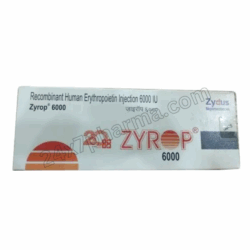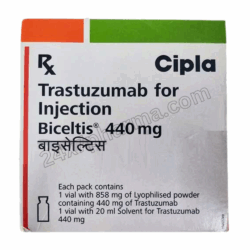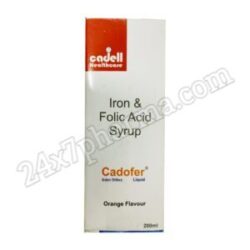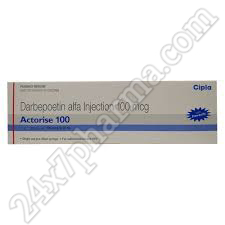ZYROP 10000 IU Injection is a medication primarily used to treat anemia, especially in individuals with chronic kidney disease, cancer patients undergoing chemotherapy, and those receiving zidovudine therapy for HIV. The active ingredient in ZYROP is erythropoietin, a synthetic version of a natural hormone produced by the kidneys. Erythropoietin stimulates the production of red blood cells, helping to alleviate symptoms of anemia such as fatigue, weakness, and shortness of breath. By increasing red blood cell counts, ZYROP 10000 IU Injection can significantly improve the quality of life for patients dealing with chronic anemia.
How Does ZYROP 10000 IU Injection Work?
ZYROP 10000 IU Injection contains recombinant human erythropoietin, a hormone that signals the bone marrow to produce more red blood cells. This hormone normally occurs in the kidneys, but when kidney function is impaired, or when certain diseases or treatments (such as chemotherapy) suppress red blood cell production, erythropoietin levels drop, leading to anemia. ZYROP Injection acts as a replacement, binding to specific receptors in the bone marrow to stimulate red blood cell production.
As a result, ZYROP helps restore red blood cell levels, which in turn improves the blood’s ability to carry oxygen throughout the body. This increase in oxygen supply can help reduce the symptoms associated with anemia, such as fatigue and dizziness, ultimately enhancing the patient’s overall energy levels and endurance.
Uses of ZYROP 10000 IU Injection
ZYROP 10000 IU Injection is used to manage anemia in the following situations:
- Chronic Kidney Disease (CKD): Patients with chronic kidney disease often suffer from anemia due to decreased erythropoietin production by the kidneys. ZYROP helps alleviate anemia in these patients, reducing the need for blood transfusions and improving their quality of life.
- Chemotherapy-Induced Anemia: Cancer treatments such as chemotherapy can damage bone marrow cells, resulting in lower red blood cell production and leading to anemia. ZYROP Injection can be used to stimulate red blood cell production in cancer patients undergoing chemotherapy, reducing the symptoms of anemia and allowing for more effective treatment.
- Anemia due to Zidovudine Therapy in HIV Patients: Zidovudine, an antiretroviral medication used to treat HIV, can cause anemia as a side effect. ZYROP Injection can help counteract this side effect by stimulating the bone marrow to produce more red blood cells.
- Surgical Patients: In some cases, ZYROP Injection is used before surgery to reduce the need for blood transfusions, especially in patients with pre-existing anemia or those at risk of blood loss during surgery.
Other Dosages
- Zyrop 2000 iu Injection
- Zyrop 3000 iu Injection
- Zyrop 4000 iu Injection
- Zyrop 5000 iu Injection
- Zyrop 6000 iu Injection
Side Effects of ZYROP 10000 IU Injection
Like all medications, ZYROP 10000 IU Injection can cause side effects, though not everyone will experience them. Common side effects may include:
- High Blood Pressure: One of the most common side effects of ZYROP is an increase in blood pressure, especially in patients with chronic kidney disease. Regular monitoring of blood pressure is recommended.
- Headache and Dizziness: Some patients may experience headaches or dizziness, which can occur as the body adjusts to increased red blood cell levels.
- Swelling: Swelling of the hands, feet, or ankles may occur in some individuals. This can often be managed by adjusting the dosage or frequency of administration.
- Injection Site Reactions: Pain, redness, or swelling at the injection site is relatively common but usually resolves quickly.
- Blood Clots: In rare cases, ZYROP can increase the risk of blood clots, which can lead to serious conditions like deep vein thrombosis, pulmonary embolism, or even stroke. Patients should report symptoms like chest pain, shortness of breath, or leg swelling to their healthcare provider immediately.
- Iron Deficiency: Since ZYROP stimulates red blood cell production, the body may require more iron to support this process. In some cases, iron supplements may be necessary to prevent iron deficiency.
Warnings & Precautions
ZYROP 10000 IU Injection should be used with caution, and certain precautions must be observed:
- Regular Blood Monitoring: Frequent blood tests are required to monitor red blood cell levels, hemoglobin levels, and iron stores in the body. This helps ensure that ZYROP is working effectively and prevents complications related to high hemoglobin levels.
- Risk of Hypertension: Patients with a history of high blood pressure should use ZYROP cautiously, as it can raise blood pressure. Blood pressure should be checked regularly throughout treatment.
- Increased Risk of Blood Clots: Patients at risk of blood clots, such as those with a history of cardiovascular disease, should discuss the risks with their doctor before starting ZYROP.
- Pregnancy and Breastfeeding: Pregnant or breastfeeding women should consult their healthcare provider before using ZYROP, as its effects on the fetus or nursing infant are not well established.
- Iron Supplementation: To support the increased red blood cell production stimulated by ZYROP, iron supplementation may be necessary. A healthcare provider will assess if iron supplements are required based on blood test results.
- Avoid Overuse: Overuse or misuse of ZYROP can lead to excessively high red blood cell counts, which can increase the risk of heart attack, stroke, and other serious complications. Always follow the prescribed dosage and schedule.
FAQs for ZYROP
1.How long does it take to see results with ZYROP?
Ans: Some patients may notice improvements in their symptoms within a few weeks, but the full effect may take longer. Regular blood tests will help assess the response to treatment.
2.Can ZYROP Injection cure anemia?
Ans: ZYROP does not cure the underlying cause of anemia but helps manage symptoms by increasing red blood cell production. Treatment may be ongoing depending on the patient’s condition.
3.Are there any dietary restrictions while using ZYROP?
Ans: There are no specific dietary restrictions; however, maintaining adequate iron levels is essential. Your doctor may recommend iron-rich foods or supplements to support red blood cell production.









